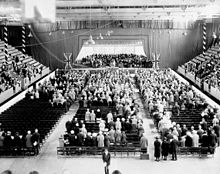Ottawa Auditorium

A Thanksgiving Service in the Auditorium, 1927
|
|
| Location | Argyle at O'Connor Street, Ottawa, Ontario, Canada |
|---|---|
| Coordinates | 45°24′40″N 75°41′22″W / 45.411°N 75.6895°WCoordinates: 45°24′40″N 75°41′22″W / 45.411°N 75.6895°W |
| Owner | Ottawa Auditorium Ltd (1923–1944) Tommy Gorman |
| Capacity | Main auditorium: 7,500, 10,000 (temporary) Concert hall: 800 |
| Field size | 200 ft × 80 ft (surface), 200 ft × 360 ft (building) |
| Surface | mechanically frozen ice |
| Construction | |
| Broke ground | April 1923 |
| Opened | December 26, 1923 |
| Demolished | 1967 |
| Construction cost | $355,000 ($4.89 million in 2017 dollars) |
| Architect | Richards and Abra |
| Tenants | |
|
Ottawa Senators (NHL) (1923–1934) Ottawa Senators (QAHA / QSHL) (1934–1954) Hull-Ottawa Canadiens (EPHL) (1959–1963) |
|
The Ottawa Auditorium was a 7,500-seat arena located in Ottawa, Ontario. It was located in Downtown Ottawa at the corner of O'Connor and Argyle Streets, today the site of the Ottawa YMCA. Built primarily for ice hockey, the arena was also used for sports events, assemblies and musical concerts.
It was built in 1923 with a 10,000-person capacity (seated and standing) to be the home arena of the NHL's Ottawa Senators by the Ottawa Auditorium Limited, a consortium controlled by T. Franklin Ahearn and Senators' owners Edgar Dey and Tommy Gorman. It replaced The Arena, built in 1907. The first NHL game held there was played on December 26, 1923 between Ottawa and the Montreal Canadiens, before 8300 fans, in which Howie Morenz scored his first NHL goal.
The building was state-of-the-art for its time. For performances and assemblies, the arena had a concert stage that would be assembled at one end of the rink, facing the length of the rink. The shape of the ice was not quite orthogonal, it is described as being somewhat 'egg-shaped' with semi-circular end boards, rather than the straight end boards with rounded corners of today's ice rinks. This design matched the shape of the rink at The Arena.
At the time of construction, the consortium took over the ownership of the hockey club as well. In 1924, Dey sold his share of the consortium and exited the rink business ending the Dey family's ownership of ice rinks in Ottawa dating back to the 1870s. In 1925, Gorman exited hockey in Ottawa, moving to New York to manage the New York Americans. Gorman sold his share to Ahearn, picking up ownership of the Connaught race track in Aylmer, Quebec. By 1930, the Auditorium was losing money as the Ottawa Senators losses increased. The Auditorium Limited debts to the Ahearn family would lead to the Senators NHL team suspending operations, then starting up again when capital was raised in 1932. By 1934, the Senators NHL franchise was moved to St. Louis, Missouri, becoming the St. Louis Eagles. The Senators were continued as a senior amateur hockey team playing out of the Auditorium. The move to St. Louis was not a success. The franchise was still a drain on the Auditorium and was folded by the NHL in 1935. In 1936, the Auditorium went into receivership and was controlled by the Royal Securities Corporation until 1945, when Gorman returned and purchased the building and the Senators. Gorman would remain an owner until he died in 1962.
...
Wikipedia
